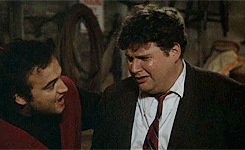I am now half-way through Bob Woodward’s Fear and believe it is the most over-hyped book since Paul Ryan began promoting Atlas Shrugged as the inspirational equivalent of the Bible. Nothing in this latest bestseller makes Donald Trump scarier than I already imagined. What actually terrifies me is the possibility South Carolina Senator Lindsay Graham, someone with less self-control when it comes to the use of military power than Kim Jung Un, has become Trump’s newest BFF and could be our next Attorney General.
But that’s not what I came here to talk about. Chapter 19 covers Trump’s decision to withdraw from NAFTA based on his belief every trade agreement ever negotiated by one of his predecessors put the United States at an inherent disadvantage. Despite objections by every senior domestic and foreign policy advisor except Peter “there is a special place in Hell for Justin Trudeau” Navarro, the Oval Office became the setting for the revival of the 1950s sitcom Trump Knows Best. Consider the following exchange between Trump and Agriculture Secretary Sonny Perdue from Fear.
 “NAFTA has been a huge boon for American ag interests,” Perdue told Trump. “We export $39 billion a year to Mexico and Canada. We wouldn’t have markets for these products otherwise. The people who stand to lose if we withdraw from NAFTA are your base, the Trump supporters.”
“NAFTA has been a huge boon for American ag interests,” Perdue told Trump. “We export $39 billion a year to Mexico and Canada. We wouldn’t have markets for these products otherwise. The people who stand to lose if we withdraw from NAFTA are your base, the Trump supporters.”
Perdue showed Trump a map of the United States that indicated the states and counties where agriculture and manufacturing losses would be hit hardest. Many were places that had voted for Trump.
“It’s not just your base,” Perdue said. “It’s your base in states that are important presidential swing states. So you just can’t do this.”
“Yeah,” Trump said, “but they’re screwing us, and we’ve got to do something.”
Based on his subsequent actions, it’s hard to tell exactly who Trump thought was doing the screwing. Our trading partners, his base or the American people in general? Since this April 25, 2017 conversation, Trump has nullified several trade agreements, subjected farmers to retaliation shutting them out of multiple international markets and dedicated $14 billion of your and my tax dollars to compensate these same farmers for a problem for which he alone is responsible.
Now I will be the first to admit no president should ever take full credit or full blame for fluctuations in the U.S. economy. An economist once observed, “The president has a better chance of controlling the tides.” However, policy decisions can accelerate or temper changes in economic growth. And the timing of such decisions may be more important than the policy details. In a May 2016 post titled “Oh, The Hypocrisy!”, I pointed out the stupidity of blocking an infrastructure program when the cost of borrowing money was near zero percent. Now, in terms of global trade policy, it again seems as though Trump and his GOP enablers slept through Economics 101 during the discussion of supply and demand. Let me explain.
The theory of supply and demand can also apply to money and income. In other words, when people have money in their pockets (supply) they can buy goods and services (demand). Which explains why Trump is somewhat correct when he says the balance of trade has been unacceptably out of kilter the last decade. But there is a very logical reason for that. The financial meltdown in the fall of 2008 was a global event. According to the World Bank, the global GDP growth rate fell from 3.83 percent in 2007 to -1.73 percent in 2010. And for several subsequent years, the global rate lagged significantly behind the U.S. recovery.
OK, Donald. I will say this slow enough for even you to understand. As the U.S. economy improved, Americans had more money and there was a pent up demand for goods and services. This demand was fulfilled by both U.S. and global suppliers. Residents of our trading partners did NOT have cash and were not buying products from ANYBODY domestically or internationally. Thus, an increase in the trade deficit.
But things have changed. The World Bank now predicts global GDP will increase by 4.5 percent in 2018. So, at the very moment the rest of the world will have the financial wherewithal to buy more U.S. goods, Trump and Navarro have abandoned free trade agreements in favor of tariffs which will redirect those dollars to non-U.S. suppliers.
Blaming the fallout from this one on Barack Obama may be the biggest challenge to date for the White House spin machine and Fox News. And that is saying something. But I have no doubt they will try.
For what it’s worth.
Dr. ESP
 And per usual, Trump will blame Democrats, the deep state or some other cabal of undermining his presidency. But as Shakespeare would have admonished the nominee, “The fault, dear Kavanaugh, is not in your stars, but in yourself, for you are an underling.” In hindsight, Kavanaugh might eventually understand this was totally unnecessary. All he had to do was admit he had a drinking problem as a young man, confirmed by his boyhood friend Mark Judge whom Ford claims witnessed the assault. In his 1997 memoir Wasted: Tales of a Gen X Drunk, Judge chronicles the rampant alcoholism at Georgetown Prep and the accompanying questionable behavior.
And per usual, Trump will blame Democrats, the deep state or some other cabal of undermining his presidency. But as Shakespeare would have admonished the nominee, “The fault, dear Kavanaugh, is not in your stars, but in yourself, for you are an underling.” In hindsight, Kavanaugh might eventually understand this was totally unnecessary. All he had to do was admit he had a drinking problem as a young man, confirmed by his boyhood friend Mark Judge whom Ford claims witnessed the assault. In his 1997 memoir Wasted: Tales of a Gen X Drunk, Judge chronicles the rampant alcoholism at Georgetown Prep and the accompanying questionable behavior. Sadly, there is no provision for a national recall election as provided for in many state and local constitutions. The authors of the U.S. Constitution left that responsibility to Congress. So let me close with a parody of the scene in National Lampoon’s Animal House when the members of Delta House console pledge Flounder after wrecking his brother’s car.
Sadly, there is no provision for a national recall election as provided for in many state and local constitutions. The authors of the U.S. Constitution left that responsibility to Congress. So let me close with a parody of the scene in National Lampoon’s Animal House when the members of Delta House console pledge Flounder after wrecking his brother’s car. This is going to be short and sweet. If you think golf is elitist, Saturday it lost its oft-deserved title to professional tennis. This is not to take anything away from Naomi Osaka who demonstrated her star power and class and who I believe would have won her first grand slam title without the help of the chair umpire.
This is going to be short and sweet. If you think golf is elitist, Saturday it lost its oft-deserved title to professional tennis. This is not to take anything away from Naomi Osaka who demonstrated her star power and class and who I believe would have won her first grand slam title without the help of the chair umpire. As you may have noticed, I have not posted an article since last Sunday due to the fact I had been unable to find the story no one else was telling. Until yesterday. While walking our dog, I was listening to an interview with David A. Kaplan, author of The Most Dangerous Branch: Inside the Supreme Court’s Assault on the Constitution. Kaplan believes the rancor over recent Supreme Court nominees is less about the candidates but the fact the nine justices have become a de facto legislative body. In short, he thinks the Court, which can set its own agenda, erred by taking cases which should have been decided by Congress or state legislatures. In cases where federal or state laws were deemed contrary to the Bill of Rights, the Court’s responsibility was not to lay out the remedy but simply nullify the statute and tell legislators to fix it.
As you may have noticed, I have not posted an article since last Sunday due to the fact I had been unable to find the story no one else was telling. Until yesterday. While walking our dog, I was listening to an interview with David A. Kaplan, author of The Most Dangerous Branch: Inside the Supreme Court’s Assault on the Constitution. Kaplan believes the rancor over recent Supreme Court nominees is less about the candidates but the fact the nine justices have become a de facto legislative body. In short, he thinks the Court, which can set its own agenda, erred by taking cases which should have been decided by Congress or state legislatures. In cases where federal or state laws were deemed contrary to the Bill of Rights, the Court’s responsibility was not to lay out the remedy but simply nullify the statute and tell legislators to fix it.